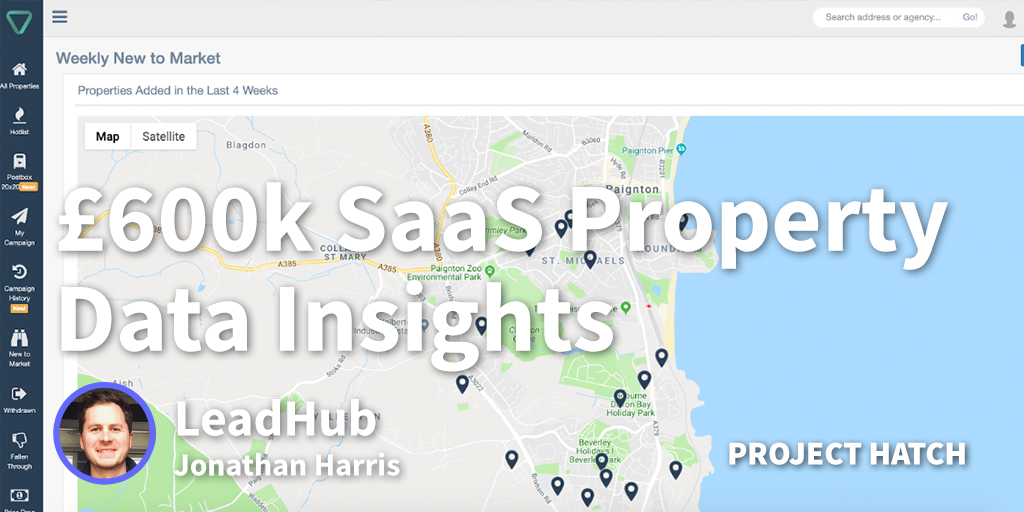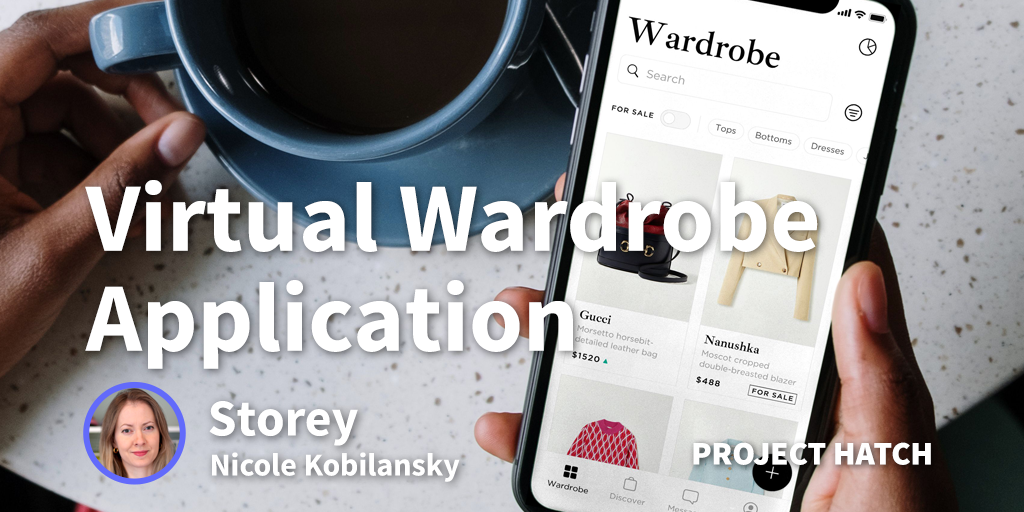LeadHub is a SaaS product that offers UK Estate Agents unparalleled data insights into what is happening in their local market, whilst also giving them the ability to act on this data through integrated prospecting options. Our dataset contains in excess of 120 million data points, all of which is continually updated and added to.
From a cold start in year one we turned over £600k, and are looking to reach the £1million mark this year. Our costs are minimal and we are completely self funded to date.
Was it a lightbulb moment of a gradual process?
The product itself was certainly more of a gradual process - in fact, we’re still very much in the ‘process’. I’m a believer that a product, especially software, is never fully complete. It is a constant cycle of conceptualising, validating and delivery.
Out of university, I worked for a company that provided lead generation software for UK Estate Agents. As a key account manager, I was in daily contact with clients and quickly became entrenched in their world - understanding their needs, frustrations and requirements. In many ways, these early days were the test bed for much of the product validation. I had no question in my mind that there was a huge need for a platform like LeadHub.
During these years, I made contacts within the industry and took to market a number of new businesses. A team of us launched BuyerPrice.com (https://angel.co/company/buyerprice) into the US back in 2016. The uptake was superb, and we hit 10% of our partner agent target in the first day. I spent a lot of time travelling between NYC and the UK, and felt passionately that we had a business here that could change the face of US Real Estate. The journey however was fraught with hiccups, mostly legal(!) and the decision was made to not pursue the idea further.
A personal passion project of mine has always been the relationship (or lack thereof) between millennials and the housing market in the UK. Homeownership is becoming increasingly inaccessible, and I set about addressing this.
Launched to much media fan far, Uppie looked to take advantage of the sharing economy (specifically Airbnb) to allow us as a business to help fund first time buyers deposits. It was at the testing and validation stage that we really discovered that people were not willing to take the risk on such a large purchase. We iterated to BrixPoints, but within 6 months the decision was also taken that without investment we’d be unable to continue.
The impact of this was ultimately detrimental to the unity of the team, and saw a breakup of the team. Determined to launch a successful product in a sector that I both knew, and had had the opportunity over years to test and validate, I teamed up with two former colleagues and set about creating LeadHub. The rest, as they say, is history.
How did you get your first three sales?
The huge advantage of launching a business into a space that you know, and have formed contacts in, is that you also have a reputation and trust. My first three sales were the result of picking the phone up to clients that I had worked with in the past, and presenting them with the product. Our first clients were fundamental in helping us test and refine the product - these early adopters have since gone on to be huge product evangelists for us, as they felt so involved in the development stage. We operate a freemium model (similar to Amazon Prime, Netflix etc), and subscriptions activate after 30 days. Our retention rate is currently 87% which is unheard of with this approach.
What are you actually selling?
A SASS marketing and data tool for UK Estate Agents.
Leadhub identifies the address of properties as soon as they enter the market, then tracks their marketing journey, informing our clients when the property has been reduced in price, withdrawn, switched agents, gone under offer, fallen through, or turned eg 4, 8, 12, 16 weeks old on the market. Agents can then mail target-specific letters via their Leadhub system within 24h of the event.
Our aim is “to provide a comprehensive nationwide platform for estate agents and businesses involved in the home moving process, to track properties on and off the market, act upon this detailed information and in doing so, better understand new opportunities, and exploit them.”
About me.
My journey into entrepreneurialism is perhaps atypical of many tech startup founders. I am a graduate in History and Global Politics, and initially it was assumed that I would pursue a career more closely aligned to these two interests. It requires delving briefly into my character to understand my founder journey so far, and unpack what fuels me.
The question that used to fill me with dread was ‘what do you want to be when you’re older?’. It always struck me, and it still does, that so many of my peers so readily had an answer to this. “Oh, a lawyer”, or “I’ve always wanted to be a teacher”,. orOr, “I’m going to go into business”. They seemed to so easily place their flag, and pin themselves to a predefined career route.
Perhaps I have been wired incorrectly but when asked 'What' I wanted to be, I would draw blanks. The British are notorious, when meeting new people, for pigeon holing them and giving them a social marker based on their response to 'What do you do?'.
It wasn't until I really began to analyse what this loaded question meant, that I really began to dissect it and find comfort in how I approached it.
From a young age, and my mother will vouch for this through gritted teeth (as would my various driving instructors!) I have been very difficult to teach. Whereas some will settle with a 'fact' being a 'fact', my brain simply will not accept information unless I have had a chance to explore it further. One one hand, this is infuriating, but on the other it means that I have become very good at drawing solutions from situations that I deem to be insufficient, and conceptualising, validating and seeing ideas grow to fruition. LeadHub, especially, is the child of this pursuit of something being done better.
What led you to invest in Honeypot?
One of the team that I was involved with in Uppie and BrixPoints went on to launch Honeypot - a new dating app for London. Every now and again you see an idea, and a founder, and know that their chances of success rank highly. Through the SEIS scheme the investment was an attractive one, and I have also ensured a close relationship with the team they’re building and fly their flag where I can. The way in which they have tested, built and launched their app really has been superb.
What is Your Target Demographic?
Our target demographic are independent UK estate agents with 1-5 branches, operating in specific areas of the country. Our product isn’t best suited for new businesses, so we specifically target those with an existing presence and reputation. Estate Agents are great clients to have - they are willing to give things a go, but do not suffer fools lightly! You have to ensure a deep working knowledge of their processes, and how your product fits into them.
What happened in the early stages?
LeadHub, and all of the others ideas have been privately funded. Each iteration since has been funded by subscription charges from users. This is a fine balance as in the early days the product certainly wasn’t worth very much at all, but those that were willing to adopt it become key drivers of how the app developed and we were able to use this feedback, and early revenues to add layers to the app that allowed further upselling.
As a team we have had to scale to match demand. I believe that startup founders can be notoriously awful at being good people managers. I have made a real point of trying to buck this trend as our team has grown, but this comes with its own challenges as all of a sudden you are responsible for managing the workload of people who don’t have the same vested interest, but also who don’t have the same ability to self start.
My advice would be to employ people that are willing, and hungry and believe in what you are looking to do. Empower them early on, make them feel included and importantly draw them alongside the wider vision for the company - this may be by means of share incentives, or other involvement, but it’s vital that they feel a crucial part of your growth.
What was the reaction of family and friends to launching your own business?
This has been a funny old experience! The nature of being an ‘agile entrepreneur’ is that family especially often find it really difficult to explain to people what it is that you do. Elevator pitches are always best done on family, as if you can condense your offering and get them to understand it then anyone will!
My wife has been extremely supportive of my various businesses. It’s not always plain sailing, especially if there is a dramatic pivot, but my experience has been that it all boils down to communication. Like with family, if you can’t explain to your spouse why you’ve done an about turn on an idea that just yesterday you were super passionate about, then you have no hope communicating this change to the wider world!
Advice for new starters.
You hear it on a lot of startup forums, but my primary piece of advice for new starters would be to not be afraid to fail (see https://medium.com/@jonathanharris_43498/the-art-of-failure-c09f6fcd52d5), or to change your mind. There is no shame in setting out with an idea, and changing it. You will be hard pressed to find a successful tech company that hasn’t had to pivot and adapt from their original idea.
My second would always be clear in your head what it is that you are looking to achieve, and what it is that that current model looks like. There is nothing more destabilizing than having those close to you question why you’re doing something if you don’t fully understand it yourself.
My third and final piece of advice would be to get comfortable with the ups and the downs. Startup life can be glamorized, and there are days where it is all that it’s cracked up to be. Engagement is high, people are loving your product, but there will be days where you feel at rock bottom. If you anticipate this then you will be better prepared to deal with it.
What has driven most sales?
Besides Linkedin, or target audience are not particularly active across the other platforms. Our greatest successes come from adwords, paid search, email and direct mail and remarketing. We are very active at national conferences and events, and drive a large amount of traffic based on this - our challenge is to convert these visitors either initially or through a cycle of re-engagement.
Our method of sign up has also been key in our ability to convert users from a freemium to a paid model. A no-commitment 30 day free trial allows anyone to create an account with no obligation to continue. We demo once they’re in, so we have their details and engagement. Our continuation rate is 87% which is unheard of for freemium SAAS models.
What is stopping growth?
There are a number of factors at play here. The industry as a whole has been squeezed with uncertainty over Brexit. The housing market seems to be the first to feel any economic murmurs, and this has been true recently. We have prioritised affordability as one of our key client benefits, so haven’t felt this like some other more expensive providers.
Internally, our focus this year is on growing a dedicated sales team. As a small team it can be difficult to focus solely on sales without being drawn into the management and development of the product. We continue to report steady growth month on month, but things can always be done better.
What tools/apps are essential?
Mondays.com - I started using Mondays.com back when it was ‘dapulse’. This has now become a completely ingrained tool for setting work priorities and quickly visualising where we’re at with certain projects.
Slack - I’m sure this is a firm favourite! As a team, we work remotely a huge amount of the time (our data specialist is currently in France doing a homestay and working from there!). Slack is wonderful for just keeping up to speed with the team.
Base Camp - We use base camp as our tool for raising and dealing with development queries and future sprints. It is better than Slack for sharing and responding to documents, and seeing when progress has been made/tasks completed.
Intercom - This is a chat-bot that has been invaluable with converting web visitors. We have specific engagement messages based on number of visitors, activity etc and it removes the need to spend time on the phone, so efficiency has also been increased dramatically.
What are your future goals?
We are constantly planning future sprints. In the pipeline, we have a plan to release data on rental as well as residential. We are also developing various bits of machine learning to begin to predict a propensity for a property to sell, as well as reporting accurately on agents market share and successful listing to conversion ratios. We’re sitting on a gold mine of data, and how we interpret and present this will be key in our future growth.
Ultimately the plan is for an exit. We’re targeting a critical number of users, and this will be our priority for 2021.
| Company Name: | LeadHub |
|---|---|
| Founder: | Jonathan Harris |






